

The OFSTED Teaching Style R.I.P. (Part One) Lesson observations for ‘Genuine improvement’ If learning is invisible.
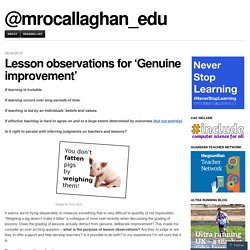
If learning occurs over long periods of time. If teaching is led by an individuals’ beliefs and values. Secret Teacher: from outstanding to inadequate in just six weeks. Just before Christmas, I had a lesson observation by an external consultant.
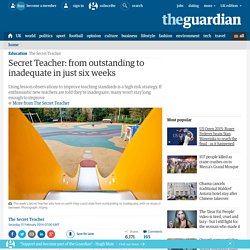
My lesson was graded outstanding and, as a teacher fresh out of induction, I was pretty proud of myself. During my newly qualified teacher (NQT) year, I had never been graded less than good. But to get that outstanding as a fully qualified teacher felt like something special; at the very least, it validated how hard I was working and justified the sacrifices I was continually making in my work-life balance. Lesson Observations: True Stress for a False Snapshot? It’s that time of the year again.
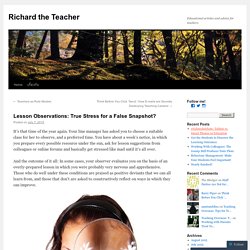
Your line manager has asked you to choose a suitable class for her to observe, and a preferred time. You have about a week’s notice, in which you prepare every possible resource under the sun, ask for lesson suggestions from colleagues or online forums and basically get stressed like mad until it’s all over. And the outcome of it all: In some cases, your observer evaluates you on the basis of an overly-prepared lesson in which you were probably very nervous and apprehensive. Those who do well under these conditions are praised as positive deviants that we can all learn from, and those that don’t are asked to constructively reflect on ways in which they can improve. There are pro’s and cons to this approach to ‘performance management’, much of which centre around the school’s culture. RCCS Teaching and Learning. We really do need to start getting this right in schools.
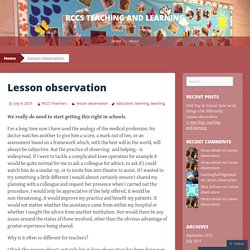
For a long time now I have used the analogy of the medical profession. No doctor watches another to give him a score, a mark out of ten, or an assessment based on a framework which, with the best will in the world, will always be subjective. But the practice of observing- and helping- is widespread. To grade or not to grade lesson observations? Some interesting reads. Joannemilesconsulting Just another WordPress.com site Skip to content.
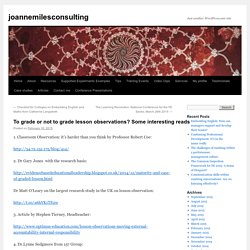
Graded Lesson Observations: Alive and Kicking? Mention the phrase ‘graded lesson observations’ in any staffroom in the country and what would be the response?
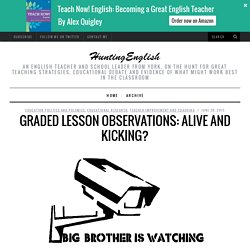
In many staffrooms they are derided as an ugly feature of a particular strain of virulent OFSTED-itus. Only three or four years ago ‘graded lesson observations’ were the norms in pretty much every school in the nation. Since then, with repeated confirmation from OFSTED, the practice is on the wane. RCCS Teaching and Learning.
If not now, when? Making the move from graded to ungraded developmental lesson observations in the FE sector. What an exciting, horizon-widening time it is in the FE sector, if we consider the debates around lesson observation models!
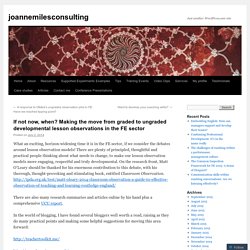
There are plenty of principled, thoughtful and practical people thinking about what needs to change, to make our lesson observation models more engaging, respectful and truly developmental. On the research front, Matt O’Leary should be thanked for his enormous contribution to this debate, with his thorough, thought-provoking and stimulating book, entitled Classroom Observation. Collection of posts on lesson observations. Here is our growing collection of posts on the subject of lesson observations from our leading thinkers. 1.

The surgeon and the scalpel 2. Fanning the glowing embers. 3. 4. Lesson Observations Unchained. A New Dawn. This is a short reflection on the massive difference it makes when you stop grading lessons.
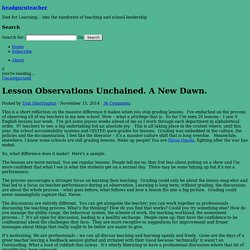
I’ve embarked on the process of observing all of my teachers in my new school. Wow – what a privilege that is. So far I’ve seen 20 lessons – I saw 9 English lessons last week. I’ve got some joyous weeks ahead of me as I work through each department in alphabetical order. 97 teachers to see; a big undertaking but an absolute joy. This is all taking place in the context where, until this year, the school accountability systems and OfSTED gave grades for lessons.
So, what difference does it make? The lessons are more normal. The process encourages a stronger focus on learning than teaching. 'Lesson observations can ruin teachers’ careers' Teaching is a complex professional practice, drawing upon layers of knowledge and skill deployed in the constantly changing context of the classroom.
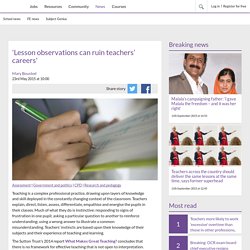
Teachers explain, direct, listen, assess, differentiate, empathise and energise the pupils in their classes. This much I know about…helping OFSTED improve lesson observations. I have been a teacher for 26 years, a Headteacher for 11 years and, at the age of 50, this much I know about helping OFSTED improve lesson observations. Members of the Headteachers’ Roundtable met with Sean Harford today, one of Her Majesty’s Inspectors and Ofsted’s National Director for Schools. Here is a Twitter conversation I had with Sean a week ago: And here is my letter to Sean… Hi Sean Now that we do not grade lesson observations, when it comes to performance management observations we can ask colleagues, ‘How would you like to be observed to help you best develop your teaching?’ Observations – is the boot on the wrong foot? I consider myself rather blessed.
I have a beautiful 22 month old daughter who is healthy, happy and seems to learn new things extremely quickly. She likes to watch other children playing a lot. She takes in everything that is going on around her and before you know it, is doing the thing she just observed. She must do a lot of this at nursery, but they’re not always positive things she copies, for instance the way she has started to snatch, or the way she has started to shout ‘no’ at the same time as frowning at me. Session 20: Lesson Observations: How do we get the best from them?
Session Title Lesson Observations: How do we get the best from them? Summary of Session. Passion, professionalism and pioneer spirit: Reflections on the “Lesson Observations: new approaches, new possibilities” conference at University of Wolverhampton, June 17th 2015 #obsconf2015. Still reeling, in a good way, from Lesson Observations: new approaches, new possibilities conference last week. I attend and present at plenty of FE conferences and they rarely create this level of buzz beforehand or deliver such excitement on the day. This was clearly a topic that people felt strongly about and were hungry to discuss, but what marked this event out for me was the tone. In workshops, keynote speeches and in the coffee queue, people were engaged in lively, constructive discussions about how they have been developing their observation cycles and what else is possible to enhance them further. There was an energy, a forward-looking feel to the day that was refreshing, reinvigorating and exciting to experience.
Listening to the speakers and meeting colleagues from the wider sector, I realised that the tide has turned on lesson observations. So, where do the passion, professionalism and pioneer spirit of my title fit into this picture? 2. Lesson study stages: 1. The Observational Scalpel by @TeacherToolkit@TeacherToolkit. This is a blog about observations. My thoughts on teaching and learning have shifted. It is common to read a book and have your thoughts struck by a bolt of lightning, but it’s even more rare to read a blog and have your pedagogy shifted.
This short blog takes inspiration from Roy Blatchford and @ScrtInspector. Would You Intervene? O Brave New School!: O is for observations. Bookmark-for-lesson-observations-2-to-a-page. Re-shaping Teaching & Learning. As the journey to shifting our whole school approach to teaching and learning continues, I thought I would post an update as recent conversations with colleagues in other schools seem to indicate that there are still anxieties, elements of uncertainty and a perception of apprehensiveness with moving to ungraded lessons. Life without lesson observation grades. In April 2014 we stopped grading lesson observations. Lesson observation is broken – can we fix it. I was observed today…. and I loved it!: Teaching outside the box. Remember the old days when a lesson observation was THE deal breaker, well at least in my mind it was.